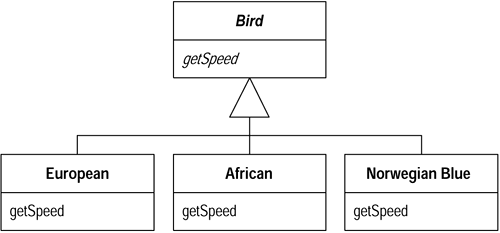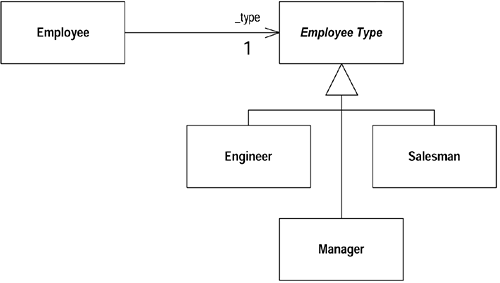You have a conditional that chooses different behavior depending on the type of an object.
Move each leg of the conditional to an overriding method in a subclass. Make the original method abstract.
double getSpeed() {
switch (_type) {
case EUROPEAN:
return getBaseSpeed();
case AFRICAN:
return getBaseSpeed() - getLoadFactor() * _numberOfCoconuts;
case NORWEGIAN_BLUE:
return (_isNailed) ? 0 : getBaseSpeed(_voltage);
}
throw new RuntimeException ("Should be unreachable");
}

Motivation
One of the grandest sounding words in object jargon is polymorphism. The essence of polymorphsim is that it allows you to avoid writing an explicit conditional when you have objects whose behavior varies depending on their types.
As a result you find that switch statements that switch on type codes or if-then-else statements that switch on type strings are much less common in an object-oriented program.
Polymorphism gives you many advantages. The biggest gain occurs when this same set of conditions appears in many places in the program. If you want to add a new type, you have to find and update all the conditionals. But with subclasses you just create a new subclass and provide the appropriate methods. Clients of the class don't need to know about the subclasses, which reduces the dependencies in your system and makes it easier to update.
Mechanics
Before you can begin with Replace Conditional with Polymorphism you need to have the necessary inheritance structure. You may already have this structure from previous refactorings. If you don't have the structure, you need to create it.
To create the inheritance structure you have two options: Replace Type Code with Subclasses and Replace Type Code with State/Strategy. Subclasses are the simplest option, so you should use them if you can. If you update the type code after the object is created, however, you cannot use subclassing and have to use the state/strategy pattern. You also need to use the state/strategy pattern if you are already subclassing this class for another reason. Remember that if several case statements are switching on the same type code, you only need to create one inheritance structure for that type code.
You can now attack the conditional. The code you target may be a switch (case) statement or an if statement.
- If the conditional statement is one part of a larger method, take apart the conditional statement and use Extract Method.
- If necessary use Move Method to place the conditional at the top of the inheritance structure.
- Pick one of the subclasses. Create a subclass method that overrides the conditional statement method. Copy the body of that leg of the conditional statement into the subclass method and adjust it to fit.
You may need to make some private members of the superclass protected in order to do this.
- Compile and test.
- Remove the copied leg of the conditional statement.
- Compile and test.
- Repeat with each leg of the conditional statement until all legs are turned into subclass methods.
- Make the superclass method abstract.
Example
I use the tedious and simplistic example of employee payment. I'm using the classes after using Replace Type Code with State/Strategy so the objects look like Figure 9.1 (see the example in Organizing Data for how we got here).
class Employee...
int payAmount() {
switch (getType()) {
case EmployeeType.ENGINEER:
return _monthlySalary;
case EmployeeType.SALESMAN:
return _monthlySalary + _commission;
case EmployeeType.MANAGER:
return _monthlySalary + _bonus;
default:
throw new RuntimeException("Incorrect Employee");
}
}
int getType() {
return _type.getTypeCode();
}
private EmployeeType _type;
abstract class EmployeeType...
abstract int getTypeCode();
class Engineer extends EmployeeType...
int getTypeCode() {
return Employee.ENGINEER;
}
... and other subclassesThe case statement is already nicely extracted, so there is nothing to do there. I do need to move it into the employee type, because that is the class that is being subclassed.
class EmployeeType...
int payAmount(Employee emp) {
switch (getTypeCode()) {
case ENGINEER:
return emp.getMonthlySalary();
case SALESMAN:
return emp.getMonthlySalary() + emp.getCommission();
case MANAGER:
return emp.getMonthlySalary() + emp.getBonus();
default:
throw new RuntimeException("Incorrect Employee");
}
}
Because I need data from the employee, I need to pass in the employee as an argument. Some of this data might be moved to the employee type object, but that is an issue for another refactoring.
When this compiles, I change the payAmount method in Employee to delegate to the new class:
class Employee...
int payAmount() {
return _type.payAmount(this);
}
Now I can go to work on the case statement. It's rather like the way small boys kill insects—I remove one leg at a time. First I copy the Engineer leg of the case statement onto the Engineer class.
class Engineer...
int payAmount(Employee emp) {
return emp.getMonthlySalary();
}
This new method overrides the whole case statement for engineers. Because I'm paranoid, I sometimes put a trap in the case statement:
class EmployeeType...
int payAmount(Employee emp) {
switch (getTypeCode()) {
case ENGINEER:
throw new RuntimeException ("Should be being overridden");
case SALESMAN:
return emp.getMonthlySalary() + emp.getCommission();
case MANAGER:
return emp.getMonthlySalary() + emp.getBonus();
default:
throw new RuntimeException("Incorrect Employee");
}
}
carry on until all the legs are removed:
class Salesman...
int payAmount(Employee emp) {
return emp.getMonthlySalary() + emp.getCommission();
}
class Manager...
int payAmount(Employee emp) {
return emp.getMonthlySalary() + emp.getBonus();
}
and then declare the superclass method abstract:
class EmployeeType...
abstract int payAmount(Employee emp);





















 1652
1652











 被折叠的 条评论
为什么被折叠?
被折叠的 条评论
为什么被折叠?








